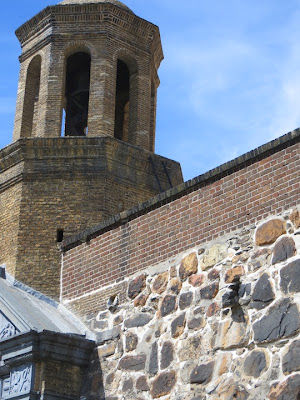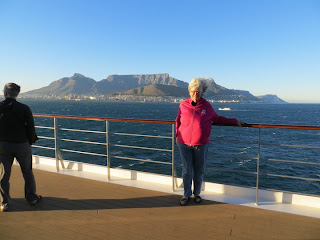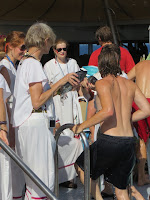My time in South Africa is largely taken up with Semester at Sea trips. I had signed up for three of them, and then was asked to lead a trip where there were no faculty or staff members, so now am committed to running three trips and participating in a fourth. It will be an intense week, but so much fun.
Today's trip was the City Orientation tour, which turned out to be largely history, with a bit of politics and geography thrown in. Our tour guide, Buz, has an infectious enthusiasm for his native country. And he is, of course, full of interesting information.
First off, he said, Table Mountain is absolutely the reason for Cape Town's location. In every other way, Cape Town is a lousy port, the most dangerous in the Southern Hemisphere. Unpredictable weather, terrible storms, crazy winds, dangerous ocean currents. But Table Mountain acts as a giant cistern, and an early shipwrecked sailor saw streams flowing from it and realized that good water and good land allowed for restocking ships' provisions on the way to India and the Far East. So Cape Town it was, the only green spot in southern Africa.
Our first stop was the Castle of Good Hope, the oldest building in Cape Town. Originally built by the Dutch trading company, it later became the headquarters for the English governor. Buz told us the stone for it was quarried on Robben Island, which was a prison back in the 1600s as well as more recently. The yellow brick came from the Netherlands as ballast in the ships and was repurposed. You can see it all over town in historic buildings.
 |
| Afternoon sundial at the castle. |
 |
| The smell of the land, specifically, grass! |
 It's an unimposing space, but it was the only space where the thousands of people could be accommodated. Tensions were running high, he said. White South Africans were terrified of losing power and terrified of the Other. For years they had been told that blacks and coloreds were going to ravish their daughters, run wild, and so on. Blacks came with arsenals in the boots of their cars. And Mandela said, "Put away the guns." His message was one of peace.
It's an unimposing space, but it was the only space where the thousands of people could be accommodated. Tensions were running high, he said. White South Africans were terrified of losing power and terrified of the Other. For years they had been told that blacks and coloreds were going to ravish their daughters, run wild, and so on. Blacks came with arsenals in the boots of their cars. And Mandela said, "Put away the guns." His message was one of peace.And it was one of strategy. As Buz told us, the whites had been preparing for the eventuality of armed insurrection, and they would have overwhelmed the opposition forces, with great loss of life on both sides. He told us of a colleague who said, "We were gobsmacked" by Mandela's announcement. But peace was the possibility that had not been tried.
 |
| Mosaic bench in the Company's Garden, depicting community watch |
 |
| Parade ground outside the Castle, with City Hall in the distance. |
The second stop on our tour was the Company's Gardens. Originally the vegetable gardens for restocking ships, it has been a botanical garden for over 100 years. We stopped there for "a bit of something," tea (or other beverage) and scones. Scones on steroids! The scones themselves tasted more like shortbread, cut open and served with a large dollop of jam and a generous portion of whipped cream. Ohmigawd good.
 |
| Not just for breakfast. |
In addition to the usual dinosaur skeletons and jaws from whales, there was an exhibit of rock art--paintings and carvings from caves and outdoors--mostly depicting shamanic healing and trance dancing. That was amazing.
 |
| Intense colors of the Malay Quarter |
Leaving the rats behind, we made our way back to the ship. I had planned to go out to dinner on shore with a friend, but reports of salmon aboard ship kept us home. In deference to the parents who are visiting, we get fancy food.
With the parent trip, the open ship event, and being in a beautiful city where English is spoken, we have a lot of visitors. A surprisingly large number of students have family living in Cape Town. There are over 100 visitors on the manifest, and more who will not come aboard. As I walked back from the dining room, I was acutely aware of being a solo traveler.




























